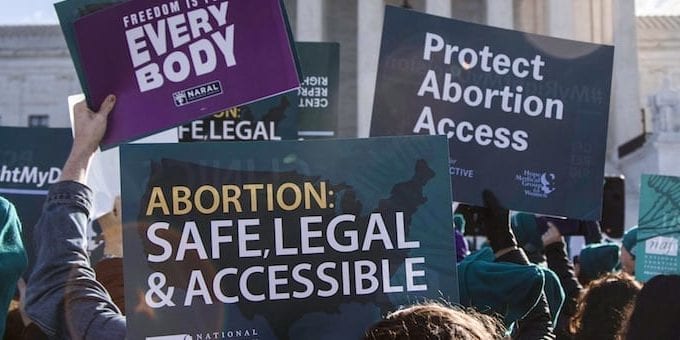Federal Court Blocks South Carolina’s Unconstitutional Ban on Abortion
Ruling follows emergency lawsuit filed by the Center and partners challenging South Carolina’s six-week ban

Update: On 3/19/21, a federal district court granted a preliminary injunction blocking this law. If it had been allowed to go into effect, abortion would have essentially been banned in South Carolina. This ruling comes as the court’s emergency order was set to expire on March 19. More information on today’s ruling can be found here.
____________
One day after South Carolina’s six-week ban on abortion was signed into law, a federal district court announced that it will temporarily block the law from going into effect. The ruling came after the Center for Reproductive Rights joined partners to file an emergency lawsuit challenging the ban as unconstitutional and a violation of almost 50 years of Supreme Court precedent.
If not blocked in court, the six-week ban could have prohibited almost all abortions in South Carolina, a state with nearly one million women of reproductive age, by banning abortion before many people know they are pregnant. The act also contains a provision that prohibits survivors of sexual assault from accessing abortion care after approximately six weeks of pregnancy unless a doctor reports their name to law enforcement, potentially over a survivor’s objections.
The emergency lawsuit was filed in federal court on behalf of South Carolina abortion providers, Planned Parenthood South Atlantic and Greenville Women’s Clinic, by Planned Parenthood Federation of America, the Center for Reproductive Rights, and the law firm Burnette Shutt & McDaniel, P.A.
“We are relieved but not surprised that the court will block this law. This ban is blatantly unconstitutional. It’s a clear attempt to end abortion access not just in South Carolina but nationwide,” said Nancy Northup, President and CEO at the Center for Reproductive Rights. “Lawmakers are trying to send cases to the Supreme Court that will allow the justices to overturn Roe v. Wade. This attack on Roe is not slowing down — there are many similar bans moving through state legislatures at this very moment.”
Abortion is already severely restricted in South Carolina, and extreme bans like these are particularly harmful for people who cannot afford to travel long distances and who already face barriers to accessing health care due to discrimination, implicit biases, and economic inequality—including people with lower incomes, young people, Black, Indigenous People of Color (BIPOC), members of the LGBTQI+ community, those living in rural communities, and people with disabilities.
A ban on abortion at six weeks of pregnancy is a violation of Supreme Court precedent, dating back to Roe v. Wade, that a state cannot ban abortion prior to viability. In this case, the Center and its partners will argue that the six-week ban violates a patient’s substantive due process rights under the Fourteenth Amendment of the U.S. Constitution.
Six-week bans on abortion have been repeatedly struck down by courts as unconstitutional. In 2015, Center lawsuits successfully blocked a six-week ban on abortion in North Dakota—and in 2020, blocked similar bans in Mississippi and Georgia.
South Carolina: Hostile to Abortion Rights
According to the Center’s state-by-state analytical tool, What if Roe Fell, South Carolina is hostile to abortion rights, with numerous medically unnecessary restrictions that already make it difficult for people to access care in the state—including a state-mandated waiting period, required biased counseling, and numerous targeted regulations of abortion provider (TRAP) laws. South Carolina also restricts the use of telemedicine for abortion care and criminalizes people who self-manage their abortions.
In South Carolina, 93 percent of counties do not have a single abortion provider. And every state that borders South Carolina is also hostile to abortion rights, leaving South Carolinians who make the decision to seek abortion care forced to face numerous burdensome obstacles or travel across more than one state to access care.
Newest Ban is Part of a Larger Trend of Ever-more Extreme Restrictions by U.S. States
South Carolina’s abortion ban is one of the hundreds of laws designed to restrict abortion to the point of elimination in the U.S. Since 2011, anti-abortion state lawmakers have passed nearly 500 laws that make abortion difficult and, sometimes, impossible to access.
Many of these requirements—including multiple clinic visits and prohibitions on telemedicine—endanger the health and well-being of pregnant people and undermine public health efforts during the COVID-19 pandemic. And in a move that would further restrict health care access during an unprecedented public health emergency, anti-abortion lawmakers in nine states used the COVID-19 pandemic as an excuse to try to ban or severely restrict abortion access last year. So far in 2021, state lawmakers have already introduced more than 200 abortion bans and restrictions, including more than 100 bills seeking to ban abortion at various points of pregnancy.
Research shows that a woman who is forced to carry an unwanted pregnancy is more likely to experience intimate partner violence, health problems, poverty, and ongoing financial distress, including rising debt and eviction.
The Center and partner organizations are working toward the reintroduction of The Women’s Health Protection Act, federal legislation that would protect abortion access throughout the U.S. from bans and unnecessary restrictions. During the last Congress, this bill earned more co-sponsors than ever before and it is on track to be reintroduced in the new Congress.
Learn more:
- The Center’s 2020 Legislative Wrap-Up, outlining abortion measures passed in U.S. states during the year.
- What if Roe Fell, the Center’s digital map providing a state-by-state analysis of abortion laws and policies.
- Evaluating Priorities, an online resource by the Center and Ibis Reproductive Health that found that U.S. states with more anti-abortion policies tend to have fewer policies supporting pregnant people, children, and families.
